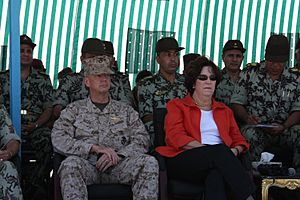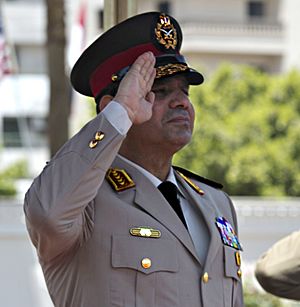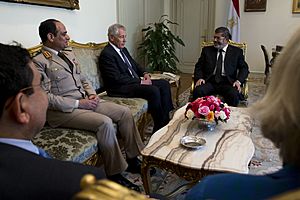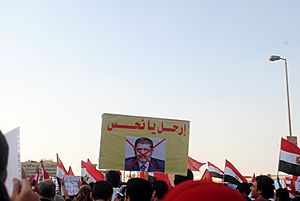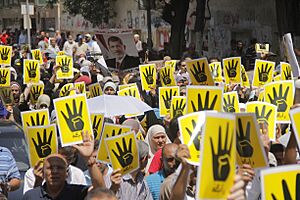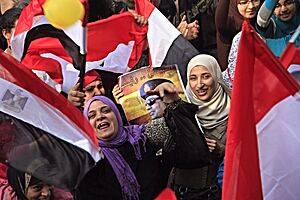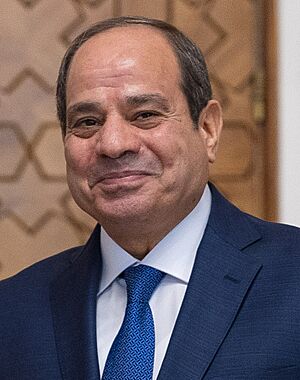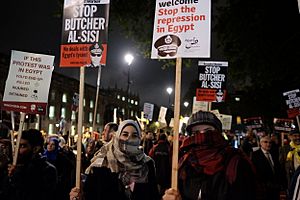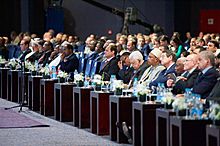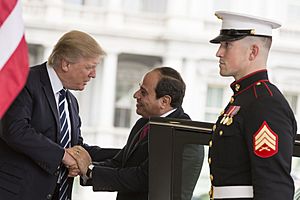Abdel Fattah el-Sisi facts for kids
Quick facts for kids
Abdel Fattah el-Sisi
|
|
|---|---|
|
عبد الفتاح السيسي
|
|
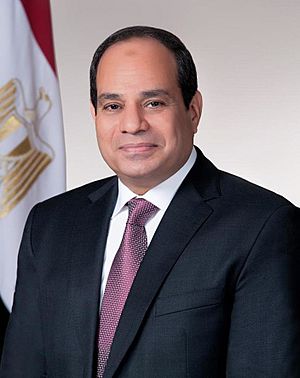
Official portrait, 2017
|
|
| 6th President of Egypt | |
| Assumed office 8 June 2014 |
|
| Prime Minister | Ibrahim Mahlab Sherif Ismail Mostafa Madbouly |
| Preceded by | Mohamed Morsi Adly Mansour (interim) |
| Deputy Prime Minister of Egypt | |
| In office 16 July 2013 – 26 March 2014 |
|
| Prime Minister | Hazem al-Beblawi Ibrahim Mahlab |
| 17th Chairperson of the African Union | |
| In office 10 February 2019 – 10 February 2020 |
|
| Preceded by | Paul Kagame |
| Succeeded by | Cyril Ramaphosa |
| Minister of Defence | |
| In office 12 August 2012 – 26 March 2014 |
|
| Prime Minister | Hesham Qandil Hazem al-Beblawi Ibrahim Mahlab |
| Preceded by | Mohamed Hussein Tantawi |
| Succeeded by | Sedki Sobhy |
| Commander-in-Chief of the Armed Forces | |
| In office 12 August 2012 – 26 March 2014 |
|
| Preceded by | Mohamed Hussein Tantawi |
| Succeeded by | Sedki Sobhy |
| Director of Military Intelligence | |
| In office 3 January 2010 – 12 August 2012 |
|
| Preceded by | Murad Muwafi |
| Succeeded by | Mahmoud Hegazy |
| Personal details | |
| Born |
Abd el-Fattah Saeed Hussein Khalil el-Sisi
19 November 1954 El Gamaleya, Cairo, Egypt |
| Political party | Independent |
| Spouse |
Entissar Amer
(m. 1977) |
| Children | 4, including Mahmoud |
| Alma mater | Egyptian Military Academy |
| Signature | |
| Military service | |
| Branch/service | Egyptian Army |
| Years of service | 1977–2014 |
| Rank | Field marshal |
| Unit | Infantry |
| Battles/wars |
|
Abdel Fattah Saeed Hussein Khalil El-Sisi (born 19 November 1954) is an Egyptian politician and former military officer. He has been the sixth President of Egypt since 2014. Before becoming president, he had a long career in the Egyptian Armed Forces.
In 2012, President Mohamed Morsi appointed Sisi as the Minister of Defense. A year later, in July 2013, large protests took place against President Morsi. In response, Sisi led the military to remove Morsi from power. This event is known as the 2013 Egyptian coup d'état.
After Morsi was removed, Sisi's supporters held large demonstrations. The government, under Sisi's command, broke up these protests. These actions were criticized by many countries and human rights groups.
In 2014, Sisi ran for president and won the election. He was re-elected in 2018 and 2023. Many groups, like Human Rights Watch, have described his government as authoritarian, meaning it has strong control over the country.
Early Life and Education
Sisi was born in the Gamaleya neighborhood of Cairo, Egypt, on November 19, 1954. He grew up in an area where Muslims, Jews, and Christians lived together peacefully. His father owned a small shop for tourists.
He decided to join the military and went to the Egyptian Military Academy. After graduating, he continued his military education. He studied at military colleges in Egypt, the United Kingdom, and the United States. This training prepared him for high-ranking positions in the army.
Sisi married his cousin, Entissar Amer, in 1977. They have four children together.
Military Career
Sisi began his career as a military officer in 1977. He served in the infantry, which is the part of the army that fights on foot. He specialized in using anti-tank weapons and mortars.
Over the years, he moved up in rank. He became a commander of several military units. In 2010, he was appointed the Director of Military Intelligence. This made him one of the most important figures in the Egyptian military.
Minister of Defense
On August 12, 2012, President Mohamed Morsi appointed Sisi as the Minister of Defense. This put him in charge of the entire Egyptian Armed Forces. At the time, he was not very well known to the public.
Sisi also became the Deputy Prime Minister. On January 27, 2014, he was promoted to the rank of field marshal, the highest rank in the Egyptian army.
2013 Change in Government
In June 2013, millions of Egyptians protested against President Morsi's government. The army, led by Sisi, gave the political parties 48 hours to solve the crisis. When they couldn't agree, the military stepped in on July 3, 2013.
Sisi announced on television that Morsi had been removed from power. He said the president had "failed to meet the demands of the Egyptian people." An interim (temporary) government was put in place.
After this, supporters of Morsi organized large protest camps. The government, with Sisi as defense minister, used force to clear these camps. This resulted in a violent clash at Rabaa al-Adawiya Square that was criticized by many international groups.
Running for President
After the events of 2013, Sisi became very popular among many Egyptians. People carried his picture at rallies and encouraged him to run for president.
Campaigns like "Sisi for President" collected millions of signatures asking him to run. At first, he said he did not want to be president. But on March 26, 2014, he announced he would run in the upcoming election.
The presidential election was held in May 2014. Sisi won with over 96% of the vote.
Presidency (2014–Present)
Sisi was sworn in as president on June 8, 2014. The day was declared a public holiday, and celebrations were held across Egypt.
In his speeches, he talked about the challenges facing Egypt. He promised to work on improving the country both at home and in its relationships with other nations. One of his first acts was to award the country's highest honor, the Order of the Nile, to the former interim president, Adly Mansour.
Domestic Policy
As president, Sisi has focused on several key areas inside Egypt. He has called for modernizing Islam by updating school textbooks and regulating speeches in mosques. He also became the first Egyptian president to attend a Coptic Christian Christmas service, calling for unity.
Some groups have criticized his government's record on human rights. They say that his government has limited political opposition and freedom of speech.
Economic Reforms
Egypt's economy faced serious problems when Sisi took office. To fix this, his government made some difficult changes. It cut subsidies, which are government payments that keep the prices of things like fuel and food low.
This made prices for fuel, transportation, and some foods go up. Sisi said these changes were like "bitter medicine" that was needed to heal the economy. The government hoped the money saved would be used for services like healthcare and education.
These reforms helped improve Egypt's credit rating. This means that international groups became more confident in Egypt's economy.
Major National Projects
Sisi's government has started several large projects to boost the economy and create jobs.
New Suez Canal
In 2014, Sisi launched a project to expand the Suez Canal. A new channel was built alongside the original one. This allows more ships to pass through, which increases the money Egypt earns from the canal. The project was completed in just one year.
New Capital City
The government announced a plan to build a new capital city east of Cairo. The goal is to reduce crowding in Cairo and create a modern center for government and business.
Other Projects
Other projects include building thousands of kilometers of new roads and developing new housing to replace unsafe neighborhoods. There is also a plan to expand farmland to grow more food for the country.
Foreign Policy
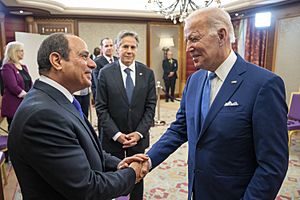
Sisi has worked to build strong relationships with countries around the world.
Arab World
Countries like Saudi Arabia, the United Arab Emirates, and Kuwait have given Egypt billions of dollars in aid. Egypt has also worked with these countries on regional security issues.
Israel and Palestine
Sisi's government supports a two-state solution to the Israeli–Palestinian conflict. This means creating an independent Palestinian state alongside Israel. Egypt has often acted as a mediator, helping to arrange ceasefires between Israel and Palestinian groups in Gaza.
Russia
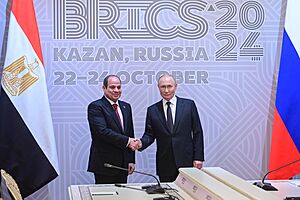
Relations between Egypt and Russia have grown stronger under Sisi. The two countries have increased their military and economic cooperation. Russia is helping Egypt build its first nuclear power plant.
United States
Relations with the United States have had ups and downs. The U.S. sometimes criticized Egypt's human rights record. However, the two countries continue to work together on security and military issues. Sisi has met with several U.S. presidents to discuss their partnership.
See also
 In Spanish: Abdelfatah El-Sisi para niños
In Spanish: Abdelfatah El-Sisi para niños
- Politics of Egypt
- Gamal Abdel Nasser
- Anwar Sadat
- Post-coup unrest in Egypt (2013–2014)
- Egyptian Crisis (2011–2014)
- Arab Winter


